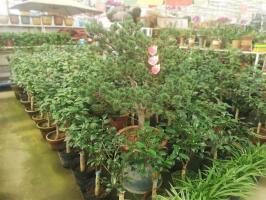Can You Use Garden Soil for Indoor Potted Plants?
Many gardeners wonder whether they can use garden soil for their indoor potted plants, and the answer is not a straightforward "yes" or "no". Using garden soil for indoor plants can be risky, as it can carry pests and diseases that can harm your plants. However, under certain conditions and with proper precautions, it is possible to use garden soil for indoor plants.
The Pros and Cons of Using Garden Soil for Indoor Plants
The main advantage of using garden soil for indoor plants is that it is more affordable and easily accessible than commercial potting soil. Garden soil also contains natural nutrients that can benefit your plants. However, there are some drawbacks to using garden soil for indoor plants. For one, garden soil may not be as well-draining as potting soil, which can lead to problems with root rot. Additionally, garden soil may contain weed seeds, insects, and other organisms that can harm your plants.
How to Use Garden Soil for Indoor Plants
If you have decided to use garden soil for your indoor plants, there are a few steps you can take to minimize the risks:
Sterilize the soil: To kill any pests or pathogens in the soil, you can sterilize it in the oven or microwave. Spread the soil evenly on a baking sheet and place it in the oven at 180°F for 30 minutes, or microwave it in a microwave-safe container for 90 seconds.
Mix in additives: To improve drainage and add nutrients to the soil, you can mix in some perlite, vermiculite, or compost.
Use a drainage layer: To prevent water from pooling at the bottom of the pot, you can place a layer of rocks or gravel at the bottom of the pot before adding the soil.
When to Avoid Using Garden Soil for Indoor Plants
While it is possible to use garden soil for indoor plants, there are some situations where it is best to avoid it:
When starting seeds: Garden soil is not recommended for starting seeds, as it can introduce pathogens into the delicate seedlings and inhibit their growth.
When growing sensitive plants: Sensitive plants like orchids and carnivorous plants require specific soil blends that are different from garden soil.
When dealing with pest or disease problems: If your garden has had problems with pests or diseases, it is best to avoid using the soil for indoor plants to prevent introducing those problems into your home.
Conclusion
While using garden soil for indoor plants can be tempting for its cost-saving benefits and natural nutrients, it is not always the best option. If you do choose to use garden soil, be sure to sterilize it and mix in additives to improve drainage and nutrient content. However, it is best to avoid using garden soil for starting seeds, sensitive plants, and when dealing with pest or disease problems.

 how many times do yo...
how many times do yo... how many planted tre...
how many planted tre... how many pine trees ...
how many pine trees ... how many pecan trees...
how many pecan trees... how many plants comp...
how many plants comp... how many plants can ...
how many plants can ... how many plants and ...
how many plants and ... how many pepper plan...
how many pepper plan...































